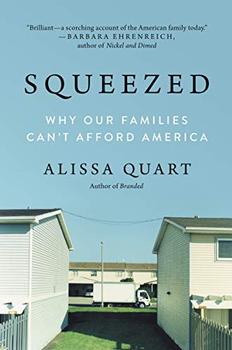Summary | Excerpt | Reading Guide | Reviews | Beyond the Book | Readalikes | Genres & Themes | Author Bio

Why Our Families Can't Afford America
by Alissa Quart
My husband was already fifty, and it turned out that our years of relative liberty—of "doing what we loved"—had finally exacted a price. When our daughter was four months old, it got even worse. We first hired a nearly full-time sitter and most of my own take-home earnings as an editor went directly to her. Eventually, my earnings also flowed to my daughter's cheerfully boho day care (even though, paradoxically, all the caregivers were most likely themselves just scraping by, despite their loving and primary-color-bright attentions). Again, given the larger field of suffering, our family's worries were relatively low-key. But still we yearned for more of a social mesh to keep us afloat. At the time, we felt like startled nocturnal animals. Subsidized day care had done so much for us. And how much would it have done for people who did not have as many choices as we did?
Eventually, my husband found a full-time editorial job, and so did I. Perhaps not so coincidentally, mine was as director and editor of a journalism nonprofit devoted to supporting reporting on inequality by a good number of reporters who had themselves fallen on truly hard times. I continue to spend my days editing these narratives.
Through these full-time positions, our family was saved from tumbling out of our class position—at least for now. But even after we found ourselves in momentary safety, I couldn't shake the self-blame. Despite our encroaching middle age, we had not planned ahead, I thought. I felt juvenile, but also suspected that the game was rigged—that unlike me, the very wealthy who now filled the city of my birth and worked in finance didn't lacerate themselves for small missteps.
This personal experience was partly how I arrived at what was to become the mantra of this book: It's not your fault. It seems key to me—to recognize that feeling in the red or on the edge isn't all your personal problem. And while some psychological analysis or boosts may help, the problem of not being able to afford to live in America can't be cured by self-help mantras. It can't be mended simply by creating a résumé that utilizes several colors of printer ink or a regimen of cleansing green juices. The problem is systemic.
Squeezed is the story of this psychological and socioeconomic predicament. Being squeezed involves one's finances, one's social status, and one's self-image. The middle class I refer to in these pages is a group defined by more than just money: it also leans on credentials, education, aspirations, assets, and, of course, household income. In the United States, the middle class is the group of working people who, according to a May 2016 Pew survey, with a yearly household income for a family of three ranging from $42,000 to
$125,000 in 2014, make up 51 percent of U.S. households. Michelle Belmont and her family were in the middle class, and they were squeezed.
The middle-class families running furiously and breathlessly just to find themselves staying in place are a large and varied coterie. It includes highly educated workers like lawyers, professors, teachers, and pharmacists, professionals who never expected to be in this situation—often feeling cast aside by a system that seems stacked against them. Their prospects for the future, given the rise of robots and automation within their professions, which you will read about later in this book, are likely to dim even further.
According to a Washington Post/Miller Center poll, 65 percent of all Americans worry about paying their bills—as the parents I've interviewed, murmuring anxiously at their dining room tables, can attest. One reason for this anxiety is that middle-class life is now 30 percent more expensive than it was twenty years ago; in fact, in some cases the cost of daily life over the last twenty years has doubled. And the price of a four-year degree at a public college—one traditional ticket to the bourgeoisie—is nearly twice as much as it was in 1996. The cost of health care has almost doubled in that twenty-year period as well. And rent, not to mention homeownership, has also become substantially more expensive, though not quite to the same horrifying level as education and medical care. Meanwhile, the ongoing decimation of unions and employees' rights continues, with pensions and minimal benefits fading. Unstable working hours are increasingly common too, making child care, always a high personal expense for families, all the harder to arrange and even more expensive while further testing family cohesion. And the squeeze on the middle class has an element of gender bias as well. It's no accident that many of the people you'll meet in this book are female. Although there are other reasons why so many of the characters of Squeezed are from the distaff side, there is one quite simple reason: motherhood is a disadvantage in the work world, with mothers statistically earning less than their male or childless peers. But fathers are harmed too: if they strive to more evenly balance their careers and their families, they may be stereotyped at work as "weak." And if they go into traditionally female caring professions—where most of the employment growth is these days—they may receive the "traditional" female lower pay.
Excerpt from Squeezed: Why Our Families Can't Afford America by Alissa Quart. Copyright 2018 by Alissa Quart. Excerpted by permission of Ecco, an imprint of HarperCollins Publishers.
All my major works have been written in prison...
Click Here to find out who said this, as well as discovering other famous literary quotes!
Your guide toexceptional books
BookBrowse seeks out and recommends the best in contemporary fiction and nonfiction—books that not only engage and entertain but also deepen our understanding of ourselves and the world around us.